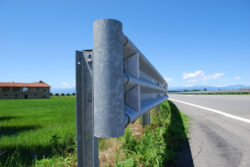 Despite the plethora of technologies put in place to prevent car accidents, thousands inevitably occur each and every day. This problem only becomes worse when the technologies created to help prevent or minimize car accidents fail.
Despite the plethora of technologies put in place to prevent car accidents, thousands inevitably occur each and every day. This problem only becomes worse when the technologies created to help prevent or minimize car accidents fail.
Unfortunately, a highway guardrail manufactured by Trinity Industries may be one of these failed technologies. Trinity allegedly redesigned its highway guardrails in 2005, but did not notify the Federal Highway Administration (FHA) of the changes, so these updates were not approved. The new, modified highway guardrail reportedly has an inch less of guardrail head. This allegedly can cause the metal to impale cars upon impact rather than simply peeling away.
A study reported by Car and Driver noted that this changes to Trinity’s guardrail made the rail’s end four times more likely to be involved in a fatal car accident than was its predecessor, the FHA-approved version.
If you or someone you love were injured in a highway guardrail accident—or if your loved one died in a guardrail crash—you may be able to file a Trinity lawsuit. So far, more than a dozen such lawsuits have been filed against Trinity Industries, citing serious issues like amputations, injuries, and death.
Trinity Guardrail Failure
Guardrails are made up of two main parts: the face (the length of the rail, attached to posts) and the end terminal (the end of the railing on either side, usually covered in yellow and black stripes for visibility.) The end terminal post has a specific function: to absorb the impact as a vehicle hits it, pushing it along the length of the rail and allowing the vehicle to slide along, while also forcing the sheet of metal rail to peel away as the vehicle moves, so that it does not pierce the vehicle and injure the driver or passengers.
However, the new guardrails from Trinity Industries may have been manufactured in a way that cuts corners—to disastrous effect. According to more than a dozen plaintiffs in a Trinity lawsuit, the changes made to the guardrail end system were made without notification to the Federal Highway Administration, and have caused dismemberment and death, among other injuries.
Trinity Industries claims the failure to notify FHA regulators of the changes by inadvertent omission. But according to an internal email obtained by ABC News, a Trinity engineer that they could “get away” with simply not telling the federal agency. Engineers estimated that the small change made to the new guardrails could save the company $50,000 in a year and, after five years, $250,000. However, cutting corners could also put countless people at serious risk of serious injury and death.
A whistleblower who called attention to the guardrail changes noted in a Trinity lawsuit that the change also means that guardrails can’t be reused, allegedly increasing the company’s sales revenue when replacement guardrails are ordered.
In several states, the new Trinity guardrail system (known as Trinity ET-Plus) has been banned, including in Kansas, Missouri, Nevada, and Massachusetts.
Filing a Trinity Lawsuit
If you or someone you love has been injured or killed due after an accident involving a failed Trinity guardrail, you may be able to pursue a lawsuit. While filing a Trinity lawsuit cannot undo the pain and suffering of a car accident, it can help to compensate for the medical expenses, lost wages, and other monetary expenses that an accident can incur.
If you were catastrophically injured in a car accident when your vehicle hit a highway guardrail end, or if your loved one died in a guardrail crash, you may qualify to file a Trinity guardrail lawsuit, regardless of why the crash occurred.
ATTORNEY ADVERTISING
Top Class Actions is a Proud Member of the American Bar Association
LEGAL INFORMATION IS NOT LEGAL ADVICE
Top Class Actions Legal Statement
©2008 – 2025 Top Class Actions® LLC
Various Trademarks held by their respective owners
This website is not intended for viewing or usage by European Union citizens.
Get Help – It’s Free
Join a Free Trinity Guardrail Lawsuit Investigation
If you qualify, an attorney will contact you to discuss the details of your potential case at no charge to you.
PLEASE NOTE: If you want to participate in this investigation, it is imperative that you reply to the law firm if they call or email you. Failing to do so may result in you not getting signed up as a client or getting you dropped as a client.
Oops! We could not locate your form.












